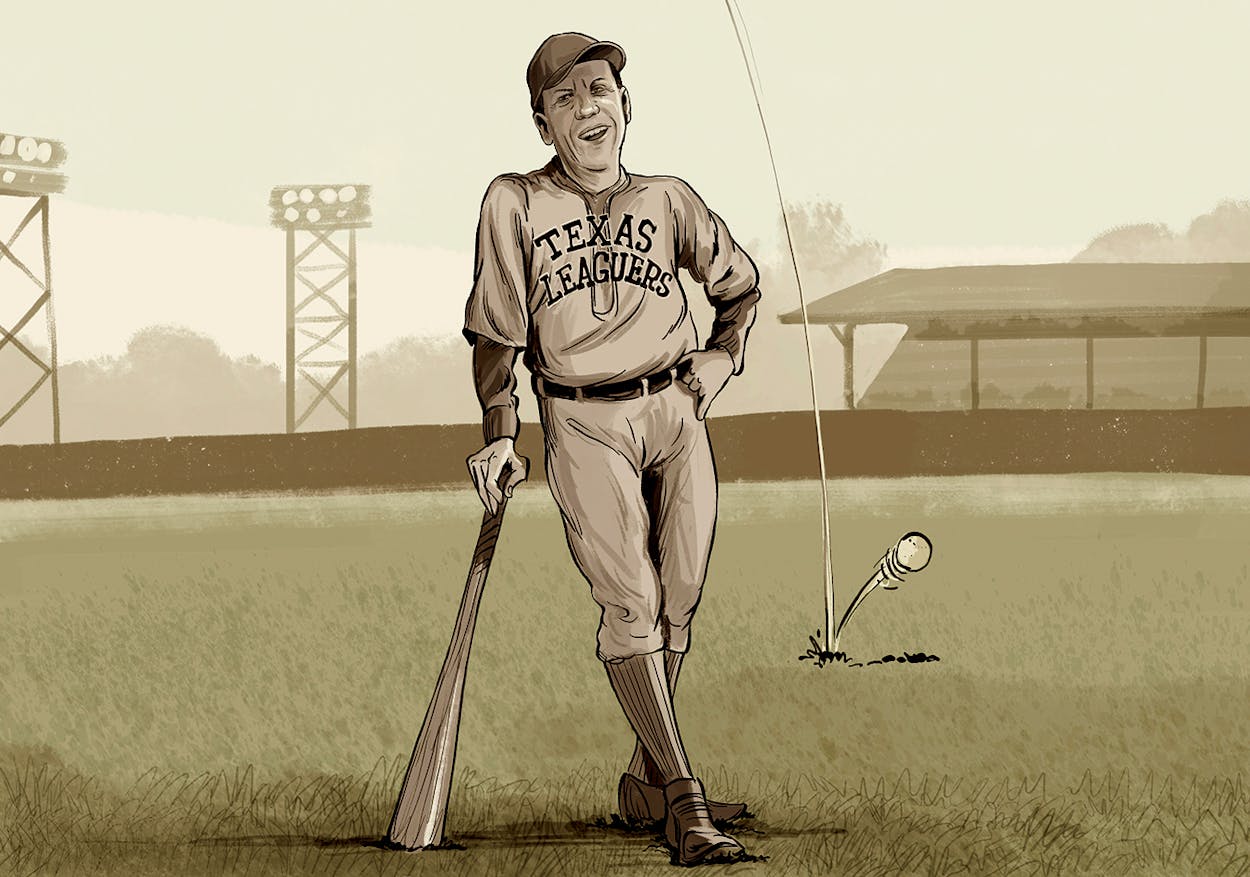Q: I recently learned that in baseball a pop fly that falls between the infield and outfield is known as a “Texas leaguer,” and now I’m curious about the term’s origin. Why is this particular occurrence referred to as a Texas leaguer? Is there some sort of interesting Texas connection? Do you know, Texanist?
Richie Sawyer, Lufkin
A: That’s a good question, Mr. Sawyer. Thanks for sending it. But as good as your query is, the answer, which does indeed involve a somewhat fascinating Texas connection, is even better.
First, allow the Texanist to slightly amend the definition you’ve provided. A Texas leaguer, for the uninformed (and, perhaps, the uninterested, too), is, as you have noted, a common baseball term that is used to describe a pop fly that drops between an infielder and an outfielder. The significant aspect you left out is that this short bloop results, somewhat improbably, in a base hit. The idiom, which has been an important part of the baseball lexicon for more than a century, dates back to the late 1890s, when Ollie Pickering, a native Illinoisan who was playing in the outfield for the nascent Texas League’s Houston Mudcats, made baseball history. On May 21, 1892, Pickering hit a whopping seven singles, to this day the most singles ever hit by a single player in a Texas League baseball game. The really remarkable thing, though, is that each and every one of these singles was reportedly the result of a weakly hit bloop that found its way just far enough over the infield to drop uncaught in the outfield. So extraordinary was the feat that news of it spread far and wide, and such hits would thereafter be known as Texas leaguers.
A few other accounts of the term’s origin exist, but this is the one the Texanist finds most credible—and the most fun. In another bit of related baseball trivia, on April 24, 1901, Pickering, who was then playing for the Cleveland Blues, became the first-ever batter in the brand-new American League.
So there you have it. Did the Texanist not tell you that this was a somewhat fascinating story?
And yet, as captivating as that tale is, the Texanist feels compelled to offer you and any other readers who are still with us an annotated list of twenty other phrases that begin with the magical word “Texas” and, with a few exceptions, have some sort of a Texas connection. This is not, of course, a complete list of such sayings and idioms, but it’s a pretty impressive grouping nonetheless. Enjoy!
1. Texas caviar: A delicious party dish starring pickled black-eyed peas that was made famous by the famous Texas transplant gourmet Helen Corbitt.
2. A Texas dip: An ostentatiously deep curtsy (way deeper than a regular old St. James bow) performed by Texas debutantes on the occasion of their social entrées.
3. Texas exit: An informal (and illegal) highway “off ramp” blazed through the grassy strip separating a main thoroughfare and the frontage road by Texans with better places to be than stuck in traffic.
4. Texas fever: An infectious cattle disease spread by ticks that was, during the heyday of the great cattle drives, associated with Texas longhorns, which were responsible for transmitting the illness to midwestern stock.
5. Texas longhorn: A hearty hybrid breed of cattle that resulted from the random interbreeding of Spanish retinto and English stock that flourished in early Texas. Also, the Texanist is compelled to say, one heck of a fine college mascot.
6. Texas rig: An advancement in sportfishing developed on Lake Tyler in the middle part of the twentieth century whereby a plastic worm is hooked in an ingenious manner that prevents dastardly snags.
7. Texas sheet cake: A large (like Texas) chocolate sheet cake (or “sheath cake” if you’re the Texanist’s dear old cake-making mother-in-law) that is baked on a sheet pan before getting sheathed in chocolate icing dotted with sweet pecan bits.
8. Texas-style stack: In highway interchange parlance, a gargantuan, five-level spaghetti bowl of knotted underpasses and overpasses first developed in Texas.
9. Texas stop sign: A Dairy Queen
10. Texas tea: Oil!
11. Texas toast: Bread that is sliced at twice the normal thickness (about ¾ of an inch) and liberally buttered or margarined or oiled and then toasted (or sometimes griddled) to a golden-brown, most likely the 1941 invention of Royce Hailey at Beaumont’s Pig Stand drive-in restaurant. As far as toasted breads go, Texas toast is, in the Texanist’s mind at least, the best thing since sliced bread of average thickness.
12. Texas Tommy: A hot dog that has been split lengthwise, filled with cheese, wrapped with bacon, and then grilled or fried. Oddly, the dish originated not in Texas but in Pottstown, Pennsylvania, where it became popular in the 1950s. (Why it received a Texas appellation, the Texanist does not know. Perhaps the people of Pottstown thought this was the sort of food Texans enjoy, and named it in our honor.)
13. Texas toothpick: This phrase refers to both a pocketknife made by W.R. Case & Sons Cutlery, also of Pennsylvania, and an actual toothpick crafted from a raccoon’s penis bone. The Texanist’s father, at various times, carried both, though there is not, to the Texanist’s knowledge, any specific Texas connection with either of these pointed objects.
14. Texas Towers: A set of three U.S. Air Force radar surveillance stations positioned in the Atlantic Ocean off the East Coast of the United States during the Cold War and so named because the platforms were modeled after the offshore drilling platforms first used off the Texas coast.
15. Texas trash: Snack mix made of cereals, such as Cheerios, Corn Chex, Rice Chex, and Wheat Chex, along with pretzels and nuts, that is Texased up a notch with the addition of chili powder and hot sauce. The phrase has also been used, unfairly, the Texanist thinks, to describe working- and lower-class people who hail from the rural regions of the Lone Star State.
16. Texas two-step: May the Texanist have this dance?
17. Texas wave: Also known as the hidy sign, the Medina wave, and the one-finger wave, the Texas wave is employed in driving the “Texas way,” which is to say, friendly.
18. Texas titty twister: A “purple nurple” that has been Texased up a notch by way of an additional half twist.
19. Texas: Deployed as a noun (not an adjective attached to a noun) and rendered with a lower case “t,” our state’s name has long been used to describe a structure on the upper deck of a Mississippi steamboat that contains the officers’ cabins and pilothouse. By convention, cabins on riverboats are named after U.S. states and since the officers’ cabin is the largest of them all, it was dubbed “texas.”
20. Texas tender: The attendant in a steamboat’s texas.
The Texanist apologizes for the lengthy digression. He hopes that he answered your original question about Texas leaguers satisfactorily and that this informal glossary of Texas-related terms was also informative—and not too much of what you might call a Texas torrent, which is what you might be on the receiving end of when a certain well-meaning Texas pundit gets a case of Texas rambling fever, which is when . . .
- More About:
- The Texanist
- Lufkin









